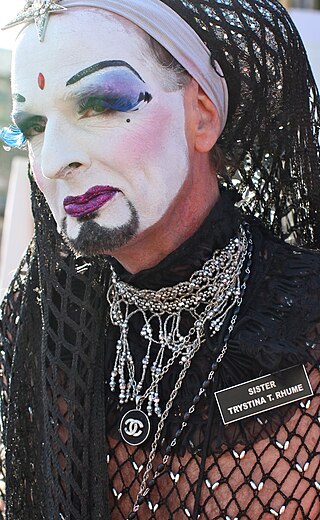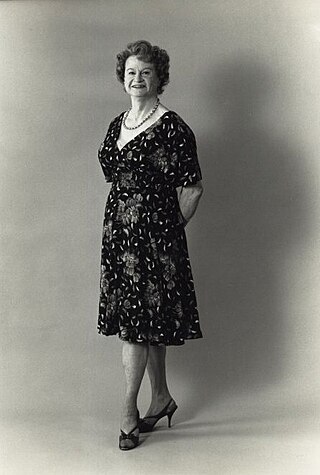
Cross-dressing is the act of wearing clothes traditionally or stereotypically associated with a different gender. From as early as pre-modern history, cross-dressing has been practiced in order to disguise, comfort, entertain, and express oneself.

Ferdinand I, nicknamed Întregitorul, was King of Romania from 1914 until his death in 1927. Ferdinand was the second son of Leopold, Prince of Hohenzollern, and Infanta Antónia of Portugal, daughter of Ferdinand II of Portugal and Maria II of Portugal. His family was part of the Catholic branch of the Prussian royal family Hohenzollern.
Transvestism is the practice of dressing in a manner traditionally or stereotypically associated with a different gender.

John William Money was a New Zealand American psychologist, sexologist and professor at Johns Hopkins University known for his research on human sexual behavior and gender. Believing that gender identity was malleable within the first two years of life, Money advocated for the surgical "normalization" of the genitalia of intersex infants.
Gender expression, or gender presentation, is a person's behavior, mannerisms, and appearance that are socially associated with gender, namely femininity or masculinity. Gender expression can also be defined as the external manifestation of one's gender identity through behavior, clothing, hairstyles, voice, or body characteristics. Typically, a person's gender expression is thought of in terms of masculinity and femininity, but an individual's gender expression may incorporate both feminine and masculine traits, or neither. A person's gender expression may or may not match their assigned sex at birth. This includes gender roles, and accordingly relies on cultural stereotypes about gender. It is distinct from gender identity.

Transgender is an overarching term to describe persons whose gender identity/expression differs from what is typically associated with the gender they were assigned at birth. Since "transgender studies" was institutionalized as an academic discipline in the 1990s, it is difficult to apply transgender to Chinese culture in a historical context. There were no transgender groups or communities in Hong Kong until after the turn of the century. Today they are still known as a "sexual minority" in China.

A gender bender is a person who dresses up and presents themselves in a way that defies societal expectations of their gender, especially as the opposite sex. Bending expected gender roles may also be called a genderfuck.
Tri-Ess is an international educational, social, and support group for heterosexual cross-dressers, their partners, and their families.

Petticoating or pinaforing is a type of forced feminization that involves dressing a man or boy in girls' clothing as a form of humiliation or punishment, or as a fetish. While the practice has come to be a rare, socially unacceptable form of humiliating punishment, it has risen up as both a subgenre of erotic literature or other expression of sexual fantasy.
The American-Canadian sexologist Ray Blanchard proposed a psychological typology of gender dysphoria, transsexualism, and fetishistic transvestism in a series of academic papers through the 1980s and 1990s. Building on the work of earlier researchers, including his colleague Kurt Freund, Blanchard categorized trans women into two groups: homosexual transsexuals who are attracted exclusively to men and are feminine in both behavior and appearance; and autogynephilic transsexuals who experience sexual arousal at the idea of having a female body. Blanchard and his supporters argue that the typology explains differences between the two groups in childhood gender nonconformity, sexual orientation, history of sexual fetishism, and age of transition.

Sexuality in transgender individuals encompasses all the issues of sexuality of other groups, including establishing a sexual identity, learning to deal with one's sexual needs, and finding a partner, but may be complicated by issues of gender dysphoria, side effects of surgery, physiological and emotional effects of hormone replacement therapy, psychological aspects of expressing sexuality after medical transition, or social aspects of expressing their gender.

Feminization or feminisation, sometimes forced feminization, and also known as sissification, is a practice in dominance and submission or kink subcultures, involving reversal of gender roles and making a submissive male take on a feminine role, which includes cross-dressing. Subsets of the practice include "sissy training" and variations thereof, where the submissive male is "trained" to become feminine.
The relationship between transgender people and religion varies widely around the world. Religions range from condemning any gender variance to honoring transgender people as religious leaders. Views within a single religion can vary considerably, as can views between different faiths.

A transgender person is someone whose gender identity differs from that typically associated with the sex they were assigned at birth. Some transgender people who desire medical assistance to transition from one sex to another identify as transsexual. Transgender is also an umbrella term; in addition to including people whose gender identity differs from the gender typically associated with their assigned sex at birth, it may also include people who are non-binary or genderqueer. Other definitions of transgender also include people who belong to a third gender, or else conceptualize transgender people as a third gender. The term may also include cross-dressers or drag kings and drag queens in some contexts. The term transgender does not have a universally accepted definition, including among researchers.

A transsexual person is someone who experiences a gender identity that is inconsistent with their assigned sex, and desires to permanently transition to the sex or gender with which they identify, usually seeking medical assistance to help them align their body with their identified sex or gender.

Virginia Charles Prince, born Arnold Lowman, was an American transgender woman and transgender activist. She published Transvestia magazine, and started Full Personality Expression, which later became Tri-Ess, for male heterosexual cross-dressers.
Androgyny is the possession of both masculine and feminine characteristics. Androgyny may be expressed with regard to biological sex, gender identity, or gender expression.
This article details the history of cross-dressing, the act of wearing the clothes of the sex or gender one does not identify with.

This article addresses the history of transgender people across the British Isles in the United Kingdom, the British colonies and the Kingdom of England until the present day. Transgender people were historically recognised in the UK by varying titles and cultural gender indicators, such as dress. People dressing and living differently from their sex assignment at birth and contributing to various aspects of British history and culture have been documented from the 14th century to the present day. In the 20th century, advances in medicine, social and biological sciences and transgender activism have influenced transgender life in the UK.

The Transsexual Phenomenon is a medical textbook published by American endocrinologist and sexologist Harry Benjamin in 1966 with The Julian Press. The text is notable for its examination of transsexualism not as a psychological issue, but rather as a somatic disorder that should be treated through medicine. Benjamin argues that transvestism and transsexuality are a spectrum of conditions, requiring different treatments that ranged from hormone replacement therapy to surgical intervention.













